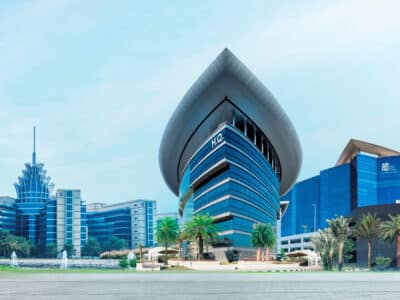Approaching the start-up community and taking care of founder mental wellbeing were both highlighted as key for the future development of both individual start-ups and the regional ecosystem.
Four experts in the Middle East start-up environment came together in a panel discussion Wednesday for a discussion on the regional start-up sphere, and how the challenges facing the sector can be addressed.
The panel featured Roberto Crocci, managing director, Microsoft for Startups MEA; Derek Watson, co-founder, N2 Technology; Sallyann Della Casa, founder, GLEAC; and Scott Cairns, group corporate structuring & market entry expert, Creation Business Consultants. The conversation was moderated by Staff Writer, the editor-in-chief of Arabian Business.
“One of the key pillars we are focusing on is building community, because building this community doesn’t just mean putting people together,” Crocci said.
“The idea of a community is also about building a platform to tell stories and these stories inspire people … it’s foundational, there’s more to do on community, it’s critical,” he added.
Watson agreed, noting that founders in the Middle East “often miss the community, in the importance of getting out there … they forget that at some point they need to talk to their customers and build their product.”
Mental health in spotlight
The start-up ecosystem community can also help alleviate the mental health problems that founders can often face.
“Many start-ups fail because their founders do it alone, there’s a huge mental health issue about going this alone. It is hard, and many of us choose to go it alone and not have community. If you look at the start-ups that make it, they are the ones that dig in and find their way through those moments, and if you look at the ones who did dig in, they are the ones who find community,” Della Casa said.
Mental health and building resilience have been highlighted as critical workplace issues over the last couple of years, and cast into the spotlight by pandemic-induced social isolation as a consequence of government lockdown orders.
In the Middle East, however, “there is a lot of stigma around talking about mental health,” Crocci said.
One key challenge that start-ups are facing that needs to be overcome relates to people, and solving people-related issues.
“As a leader you need to be vulnerable, as a founder you need to be vulnerable. You need to be comfortable with that and share it with the team so people can feel comfortable,” Crocci said.
“I think some people try and be an expert in everything, but that’s not going to work, they spend so much time and energy trying to learn something that they could have got from someone else,” Cairns explained.
In addition, Cairns noted that when starting a business, founders need to not only plan for how to succeed, but also what happens if part of the plan goes wrong.
“If they haven’t planned for that at the start that’s often where the business ends,” he said.
Founders also need to understand the venture capital (VC) investors that they are targeting, Watson explained, noting that for VCs, the goal is return on investment.
“VCs say no a lot, in fact, saying no is their job, that’s what they do. On the other side of it means that founders [will] meet a lot of them, hear a lot of them, that’s just depressing,” he said.
Outlook for Middle East start-ups unclear
Panellists were divided on the current outlook for the Middle East start-up ecosystem.
“On one hand, the start-up scene here in the region is vibrant and booming … Definitely the growth in terms of investment is significant, the growth in the types of start-ups in great,” Crocci said.
There are, however, “still some gaps we need to address, we need to see more evolution, but definitely the feeling is positive,” he added.
Della Casa called attention to the problems facing female and tech start-ups, noting that, “for most start-ups that are building products from scratch that haven’t been tested in other markets we still have to go out of the region for valuation, we still have to go out of the region for tech.”
“Compared to three years ago, while a lot is being done, there is still a lot of noise, and still not a lot of signal in terms of innovative start-ups, and this is a problem around the world, especially for female start-ups,” she said.
The AB Start-up Forum was held on Wednesday, January 26, and featured two masterclass courses for start-ups in how to prepare a pitch deck and develop the skills needed to negotiate with investors.
The event also featured the exciting Future Falcons event, which saw a group of five start-ups compete for a prize pot of AED250,000 to help grow their business.








